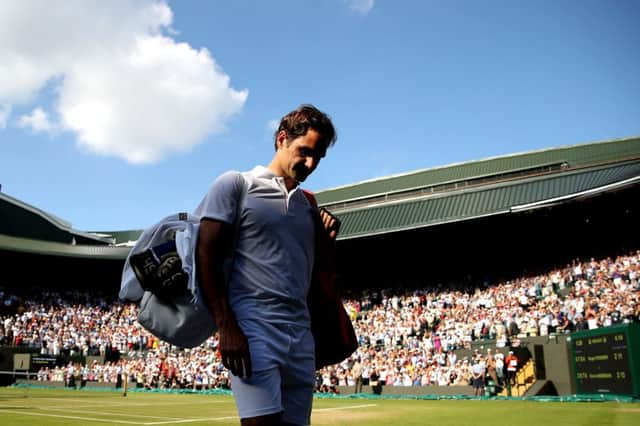Roger Federer proves he's human as favourite crashes out of Wimbledon


It can happen to anyone but that it should happen to Federer and happen here at the All England Club seemed unthinkable. Almost as unthinkable as him playing on Court One (his first appearance in the boon docks in three years). But happen it did and from holding and fluffing a match point in the third set against Kevin Anderson, he went on to lose a little over two hours later 2-6, 6-7, 7-5, 6-4, 13-11.
Going into the match, Federer was the favourite in every sense. He was the top seed, the defending champion and in four previous meetings with the 6ft 8in South African, he had not dropped a set. On a fast court or a slow one, indoor or out, he had never given Anderson a look-in. And then yesterday, he shanked that chance to move into the semi-finals and everything changed.
Advertisement
Hide AdAdvertisement
Hide AdNo one had seen the result coming, not even the loser. Federer got off to a flying start, breaking Anderson and his fearsome serve in the opening game. Just 26 minutes later, he was a set to the good and all seemed well.
He was reading the Anderson serve, sometimes blocking it back, sometimes getting a look at a second serve and nailing the return. And even if Anderson put up better resistance in the second set, it seemed futile – Federer took the second set on a tiebreak and from two sets up, surely he could not lose.
But something unnerving had happened in that second set: Federer dropped serve. It was the first time he had been broken during the tournament and it was the first sign of frailty. Oh, sure, he righted the wrong a couple of games later, breaking back and levelling the score, but the first seeds of doubt had been sewn.
And then came Federer’s moment. Serving to stay in the match at 4-5, Anderson was brought scrambling in to pick up a drop shot. He got, all right, there but then sent his backhand flying wide of the mark. This was the moment the champion had been waiting for: a break point that doubled as a match point. And he blew it. That mis-hit backhand sailed out of court and he never had a chance again.
“Today was one of those days,” Federer said. “I think it went in spells a bit also, how I was able to return his serve. I had moments where I was great, I felt like I was reading his serve, other moments where I don’t know where the hell I was moving to. I don’t know if that was his serve. But I also have a feeling, it was a feeling of mine, of not getting it right.
“Then off the baseline I wasn’t feeling as good either as I had hoped to, but still good enough to be in there and maybe win the match. I wasn’t too concerned. Even at ten all in the fifth, it’s all good. I still felt like all he needed to do was give me a few second serves, finally pick the right sides again, things could change. I wasn’t - how do you say – horribly negative the whole game.
“It’s just not one of my best days, but they don’t happen very often either. It’s one of those average days you have to try to win the match, and I just couldn’t get it done today.”
The forehand, the usually imperious forehand that at times defies the laws of physics with its whip, spin and trajectory, misfired. Popular wisdom has it that it is Federer’s backhand that is his weaker flank but against Anderson he was forced into 49 forehand errors and added in 22 unforced errors of his own.
Advertisement
Hide AdAdvertisement
Hide AdAnderson’s first serve was, as expected, big, penetrating and effective (his 28 aces were more than a set’s worth of free points) but it was the solidity of his second serve that was causing Federer the problems: there was no weakness for the Swiss maestro to exploit. Where to look? What to do?
But even in the fifth set, with Federer serving first, there was still the belief that the champion would pull through. Or there was until, after four hours of toil, he served his first double fault of the match and only his fourth of the tournament. It gave Anderson a break point and when, seconds later, Federer dumped another forehand into the net, the big South African just had to hold both his nerve and his serve and a place in the semi-finals would be his. He did and it was.
Perhaps, someone suggested, a defeat like this would feel like unfinished business and would motivate Federer to make sure he comes back next year.
“Of course, the goal is to come back here next year,” Federer said. “I wouldn’t call it ‘unfinished business’. I felt like I did some good business here in the past already.”
Federer will be almost 38 next summer. Maybe by then his best business will be behind him.